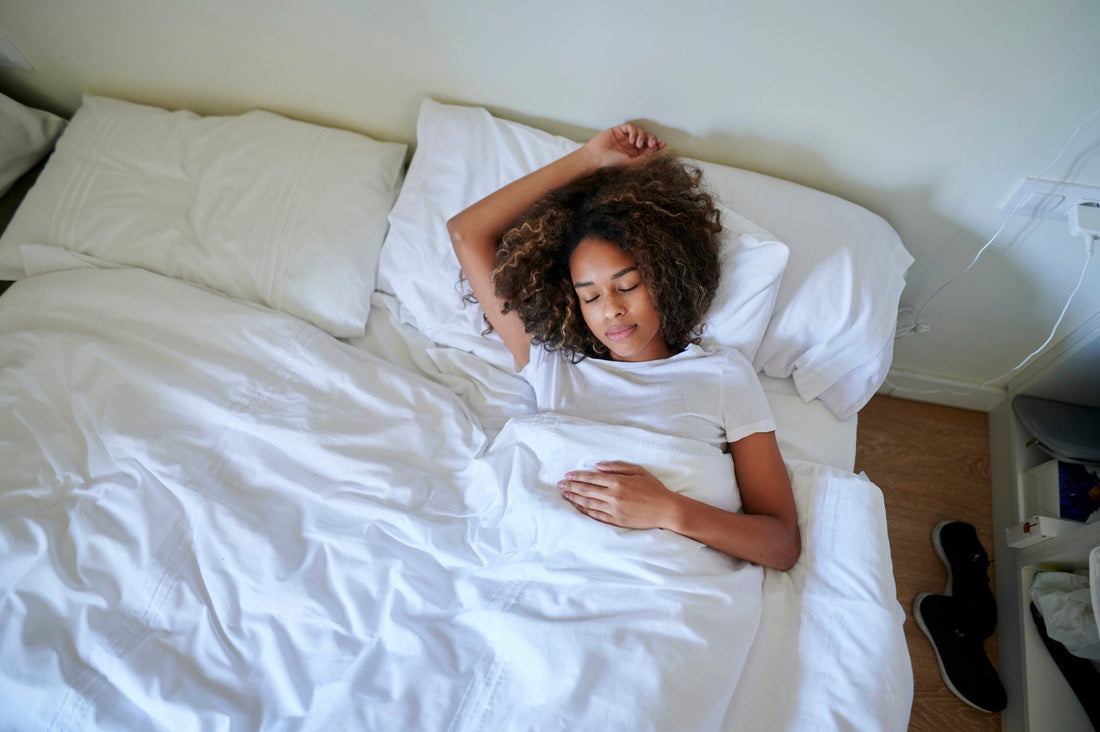Read Time: 5 min | Categories: Mental Health and Sleep
Supplements for Sleep: What Works and How to Choose the Best Option for You
Maxine Fidler, ND
Share this article
While sleep is crucial for health and well-being, only 61% of Canadian adults report high sleep quality, and just over 75% are meeting the recommended sleep duration. [1] Poor sleep can significantly impact quality of life. The good news is that supplements can really aid in restorative sleep.
Your best options for sleep supplements will depend on your personal needs. We will discuss the most commonly used natural sleep aids, their typical dosages, and how to choose the right one(s) for you.
Best Supplements for Sleep
Sleep supplements are best taken 30–60 minutes before bed and work best paired with sleep hygiene measures, which you can read more about in this blog.
Herbs

Chamomile flowers were used in ancient Persian medicine to benefit the nervous system, promoting calm relaxation and gently easing the transition to sleep. [2] It is available in multiple forms, but its mild taste makes it popular in tea form. [3]
Valerian root was used as a sedative by the ancient Greeks. [4] It promotes calm and relaxation as well as sleep. While it has not been shown to affect the amount of time either falling asleep or staying asleep, it may significantly improve the subjective quality of sleep. [5] It is most often consumed in capsule form, though it is also available in other forms.
Passionflower was named by Spanish explorers and has a history of use for feelings of occasional stress. [6] If stress levels are keeping you awake at night, passionflower may be a good choice for you. It is commonly consumed in capsule form, though it is available in other forms.
Hops, used for centuries in food as well as brewing beer, has been used in herbal medicine for relaxation and sleep. It is often combined with valerian. In one study, hops in addition to valerian was better than valerian alone. It is commonly consumed in capsule form, though it is available in other forms. [7]
Ashwagandha root is a well-known adaptogenic herb used in traditional Ayurveda. Adaptogens help improve resistance to both mental and physical stress, so they may help prevent stress from keeping you awake at night. [8] For ashwagandha, it is important to choose a standardized product that is manufactured to the highest quality standards, such as KSM-66®, which is found in Webber Naturals Ashwagandha.
Supplements

As with the herbal options, magnesium and/or melatonin should be taken 30–60 minutes before the desired bedtime to help with optimal sleep.
Melatonin is a hormone that your body naturally produces to help you fall asleep. In supplement form, it may help you fall asleep faster and stay asleep longer. It has also been shown to improve sleep quality. [9,10] It may be particularly helpful for you if you are trying to regulate your sleep/wake cycle, are suffering from jet lag, or do shift work. Do not use melatonin if pregnant or breastfeeding.
Melatonin is commonly available in amounts of 1–10 mg. Generally, people start with 1–3 mg and can increase the dose as needed, up to 10 mg. If you take melatonin and can fall asleep but have difficulty staying asleep, a timed-release form may better serve you. You can learn more about melatonin dosing here.
How much melatonin should I take?
The general recommended dose for uses except jet lag is between 0.1-10 milligrams once a day, at or before bedtime. If sleeplessness persists for more than four weeks, consult with your health care practitioner. [11]
Magnesium is a mineral involved in over 300 reactions in the human body and helps support muscle health. It may help decrease stress, which may improve sleep. [12] Magnesium may also help alleviate muscle tension and soreness that can keep you awake at night, as well as help with restless legs. [13] Magnesium bisglycinate is widely used to support relaxation and sleep, and is gentle on the stomach.
How much magnesium should I take for sleep?
One study showed that 250 mg of magnesium, twice per day, helped improve sleep quality. [12]
Herbs for Different Facets of Sleep
| Herb | Adult dose | Calm and relaxation | Sleep | Muscle function |
|---|---|---|---|---|
| Chamomile | 1.5–24 g/day | x | ||
| Valerian | 0.3–12 g/day | x | x | |
| Passionflower | 0.25–8 g/day | x | x | |
| Hops | 0.5–6 g/day | x | x | |
| Ashwagandha | 2–6 g/day | x | x | |
| Melatonin | 0.1–10 mg/day | x | ||
| Magnesium | 20–500 mg/day | x | x |
Often, sleep supplements can be found in blends, which can be more convenient and cost-effective depending on your personal needs. Such blends can include immediate-release melatonin to help you fall asleep, timed-release melatonin to help you stay asleep, and other calming herbals such as valerian, passionflower, and hops; these can be found in tea formulas, tinctures, or even combined with melatonin.
Avoid taking sleep supplements or teas with alcohol or medications that cause drowsiness. If you are pregnant or breastfeeding, consult with your physician before taking sleep supplements or herbal teas. Sleep supplements or herbal teas should generally be taken 30–60 minutes before your intended bedtime.
If you find that lack of sleep is significantly impacting your quality of life, and the things you have tried haven’t worked, please check in with your physician for additional options.
